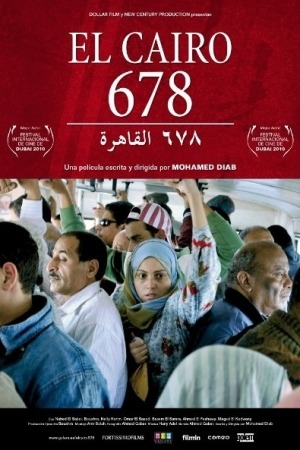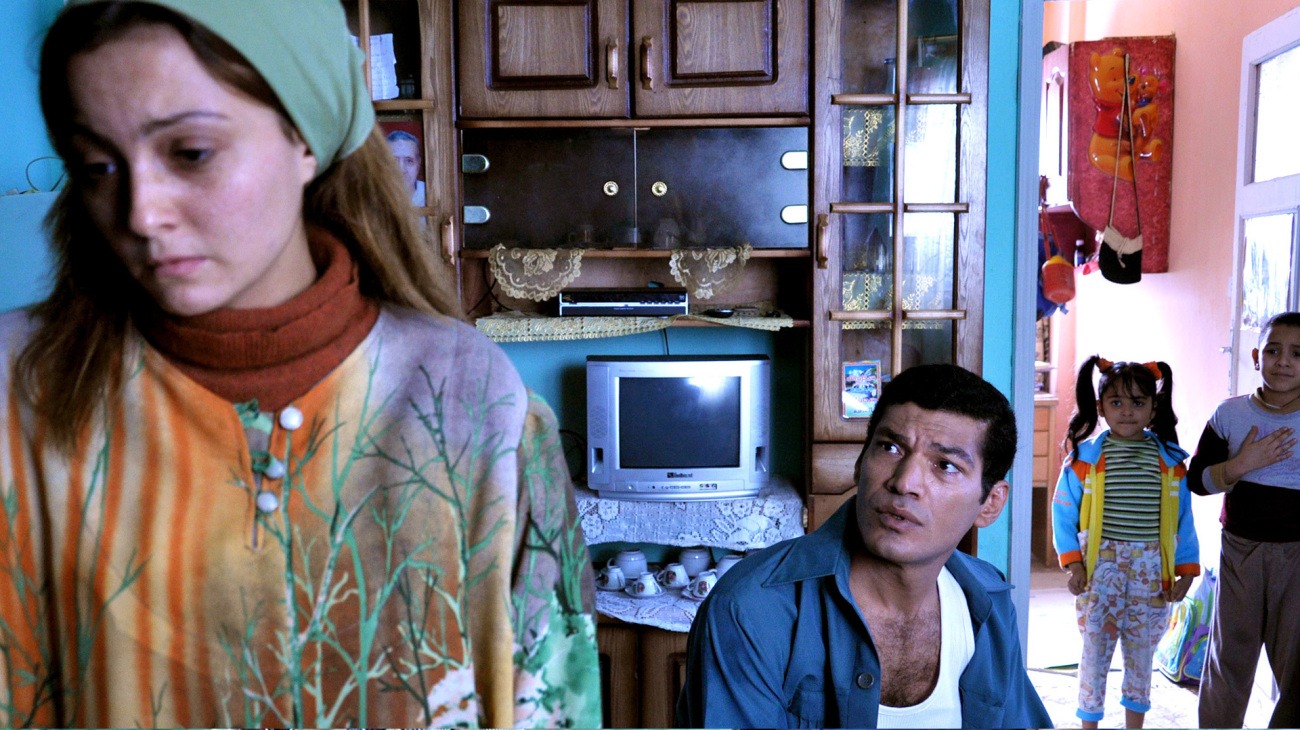
The 47th Chicago International Film Festival
Screens at CIFF: 10/9 & 10/10 & 10/12
World premiere: 12 December, 2010, Dubai International Film Festival
It's awfully easy for a parochial American to have a haughty attitude about Muslim majority countries' treatment of women; it's even easier when filmmakers from those countries come out with blistering films that expose in heartwrenching detail just how awful a woman's life in that society really is.
Viz: Cairo 678, or better yet the plain 678 of its native release (the title refers to a bus line where some of the plot's key incidents occur), Mohamed Diab's pointed & urgent (if ultimately self-congratulatory) directorial debut about the culture of sexual harrassment in his native Egypt, a story inspired, it is said, by true events, and the passage as recently as 2009 of a law that officially made it illegal for men to aggressively grope women right there in public.
Three women's personal stories form the backbone of the plot: Fayza (Boshra) is a devout mother of two with a crummy, sexually avaricious husband (Bassem Samra), whose commute to and from work is a daily gauntlet of sleazy, grasping men on the bus; Seba (Nelly Karim), who was practically gang-raped following a soccer victory a year ago and has responded by founding a school teaching women how to fight back against sexually aggressive men; and Nelly (Nahed El Sebai), an aspiring stand-up comic who is dragged for several yards by a moving car whose occupant refuses to stop pawing at her as he drives, and retaliates by filing the first-ever sexual harassment lawsuit in Egyptian history.
(An aside on terminology: maybe it's a translation issue, but if we can't call dragging a woman alongside your car as you grab at her breasts "sexual assault", I don't know why we even bother with that phrase. And yet, without fail, the word "harassment" is always used).
Eventually Fayza is emboldened by Seba's teachings to start lashing out at her would-be attackers with a tiny penknife to the crotch; not enough to do anything but bloody their pride, but it creates a huge stir that eventually brings the women to the attention of a crackerjack police detective (Maged El Kedwany), whose desire to see the mystery vigilante brought to justice battles precariously with his reluctant awareness that there's no other recourse for the slasher to fight back against the systemic sexism of the culture. He's not the most sympathetic male figure; that honor goes to Nelly's fiancé (Omar El Saeed), who is so eagerly supportive of her in everything she does that he comes off a bit like a male screenwriter's desperate attempt to prove that some men are extremely fair and nice and noble; but the detective, now he's a hell of a rounded character, and El Saeed's performance is absolutely fantastic.
This is very much the women's show, though: not just in the acting (Boshra and Karim are both outstanding, El Sebai rather less so), but in the complexity and nuance Diab weaves around his three lead characters, wholeheartedly supporting their resentment at the unjustice around them while weighing their illegal, desperate actions with a sympathetic and objectively concerned eye. Separating out the film from its message - not easily done, for this is first and above all a message picture, though a sufficiently enthusiastic and pure example of the form that I don't see any reason to whine about it - there's still a fine, difficult consideration of the morality involved when evil can only be countered with evil, and Boshra's work especially manages to navigate some extremely subtle terrain, particularly since her character, afflicted with a sense that women are responsible for their own victimisation, is the most complicated of the three.
Admittedly, parts of the script are excessively schematic: before he unites the women in common cause, Diab plays around with their individual stories in an annoying bit of chronological sleight-of-hand that suggests the worst tendencies of hyperlink cinema, and towards the end, the psychological and sociological richness of the earlier parts of the movie are jettisoned for simplistic cheerleading that makes for trite melodrama and wholly unpersuasive realism; and by this point, the gradations between the three women have ossified into discrete "roles" for each of them.
But a shaky start and a cloying finale can't suck all the wind out of such a forceful middle, and Diab's straightforward handling of the material (it's standard-issue handheld shakycam cinematography with a side of naturalistic lighting and swift cutting), if faintly anonymous, has the admirable merit of never once getting in the way of the story he's telling; and the story, of course, is the real star of the show. With bold anger and energy, 678 is a great snapshot of a society torn between tradition and progress (it opened some weeks before the 2011 revolutions began, but it does a damn good job of depicting the sense of social imbalance and outrage that led there), and whatever missteps it makes along the way can be written off as the mistakes of a filmmaker so driven by his material that he couldn't be bothered to check himself for fear of losing that fire and momentum.
8/10
World premiere: 12 December, 2010, Dubai International Film Festival
It's awfully easy for a parochial American to have a haughty attitude about Muslim majority countries' treatment of women; it's even easier when filmmakers from those countries come out with blistering films that expose in heartwrenching detail just how awful a woman's life in that society really is.
Viz: Cairo 678, or better yet the plain 678 of its native release (the title refers to a bus line where some of the plot's key incidents occur), Mohamed Diab's pointed & urgent (if ultimately self-congratulatory) directorial debut about the culture of sexual harrassment in his native Egypt, a story inspired, it is said, by true events, and the passage as recently as 2009 of a law that officially made it illegal for men to aggressively grope women right there in public.
Three women's personal stories form the backbone of the plot: Fayza (Boshra) is a devout mother of two with a crummy, sexually avaricious husband (Bassem Samra), whose commute to and from work is a daily gauntlet of sleazy, grasping men on the bus; Seba (Nelly Karim), who was practically gang-raped following a soccer victory a year ago and has responded by founding a school teaching women how to fight back against sexually aggressive men; and Nelly (Nahed El Sebai), an aspiring stand-up comic who is dragged for several yards by a moving car whose occupant refuses to stop pawing at her as he drives, and retaliates by filing the first-ever sexual harassment lawsuit in Egyptian history.
(An aside on terminology: maybe it's a translation issue, but if we can't call dragging a woman alongside your car as you grab at her breasts "sexual assault", I don't know why we even bother with that phrase. And yet, without fail, the word "harassment" is always used).
Eventually Fayza is emboldened by Seba's teachings to start lashing out at her would-be attackers with a tiny penknife to the crotch; not enough to do anything but bloody their pride, but it creates a huge stir that eventually brings the women to the attention of a crackerjack police detective (Maged El Kedwany), whose desire to see the mystery vigilante brought to justice battles precariously with his reluctant awareness that there's no other recourse for the slasher to fight back against the systemic sexism of the culture. He's not the most sympathetic male figure; that honor goes to Nelly's fiancé (Omar El Saeed), who is so eagerly supportive of her in everything she does that he comes off a bit like a male screenwriter's desperate attempt to prove that some men are extremely fair and nice and noble; but the detective, now he's a hell of a rounded character, and El Saeed's performance is absolutely fantastic.
This is very much the women's show, though: not just in the acting (Boshra and Karim are both outstanding, El Sebai rather less so), but in the complexity and nuance Diab weaves around his three lead characters, wholeheartedly supporting their resentment at the unjustice around them while weighing their illegal, desperate actions with a sympathetic and objectively concerned eye. Separating out the film from its message - not easily done, for this is first and above all a message picture, though a sufficiently enthusiastic and pure example of the form that I don't see any reason to whine about it - there's still a fine, difficult consideration of the morality involved when evil can only be countered with evil, and Boshra's work especially manages to navigate some extremely subtle terrain, particularly since her character, afflicted with a sense that women are responsible for their own victimisation, is the most complicated of the three.
Admittedly, parts of the script are excessively schematic: before he unites the women in common cause, Diab plays around with their individual stories in an annoying bit of chronological sleight-of-hand that suggests the worst tendencies of hyperlink cinema, and towards the end, the psychological and sociological richness of the earlier parts of the movie are jettisoned for simplistic cheerleading that makes for trite melodrama and wholly unpersuasive realism; and by this point, the gradations between the three women have ossified into discrete "roles" for each of them.
But a shaky start and a cloying finale can't suck all the wind out of such a forceful middle, and Diab's straightforward handling of the material (it's standard-issue handheld shakycam cinematography with a side of naturalistic lighting and swift cutting), if faintly anonymous, has the admirable merit of never once getting in the way of the story he's telling; and the story, of course, is the real star of the show. With bold anger and energy, 678 is a great snapshot of a society torn between tradition and progress (it opened some weeks before the 2011 revolutions began, but it does a damn good job of depicting the sense of social imbalance and outrage that led there), and whatever missteps it makes along the way can be written off as the mistakes of a filmmaker so driven by his material that he couldn't be bothered to check himself for fear of losing that fire and momentum.
8/10






